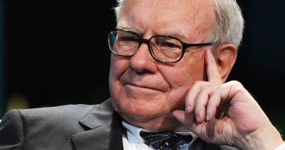
亿万富翁投资者人沃伦•巴菲特(Warren Buffett)退休后,谁将接掌伯克希尔哈撒韦公司(Berkshire Hathaway)?这个问题多年来是金融界人士一直在玩的一个猜谜游戏。
目前无意退休的巴菲特早就说过,他会分拆最高职位的职能,由一名首席执行官负责伯克希尔的各个营业公司,再由若干经理人——可能在一名首席投资官的领导下——管理其庞大的投资组合。
然而,对首席投资官职位的争夺在周一晚间变得更加激烈了。伯克希尔表示,公司从康涅狄格州聘请了一位39岁的对冲基金经理,掌管公司旗下大部分的投资组合——这是伯克希尔所做的与继任问题相关的首次公开任命。
伯克希尔的首席投资官是金融业最令人垂涎的职位之一。这项任命让过去5年掌管着Castle Point Capital基金的托德•康姆斯(Todd Combs)一下子就跑在了竞争队伍的前列。
他和伯克希尔子公司MidAmerican Energy和NetJets的董事长大卫•索科尔(David Sokol)一样,也成了公众瞩目的焦点。市场普遍传言,索科尔将接替首席执行官一职。
不过,在接受《纽约时报》(New York Times)采访时,巴菲特小心地警告称,虽然康姆斯"最有可能成为"首席投资官,但他尚未作出最终决定。他补充表示:"如果我们找到合适的先生或女士,我们也会录用那个人。"
事实上,一些巴菲特候选人的记录可谓好坏参半。在伯克希尔2009年股东大会上,巴菲特承认,其中一些领先者在金融危机期间犯下了错误。但巴菲特也表示,他会让他们过关,因为他自己在经济低迷期间也并非"满载盛誉"。
巴菲特告诉《华尔街日报》(Wall Street Journal),另一位领先的候选人——美籍华人、对冲基金经理李路最近退出了竞争,因为李路认为,目前职位带给他的地位和薪水已经足够了。
伯克希尔控制着70多家不同的企业,包括铁路公司Burlington Northern Santa Fe、汽车保险公司Geico和位于内布拉斯加的珠宝店Borsheims。然而,公司总部员工还不到30人。
截至今年6月底,伯克希尔拥有约1000亿美元资产,其中不到一半投资于股票,大多数是大型蓝筹公司的股票,例如可口可乐(Coca-Cola)、美国运通(American Express)和卡夫食品(Kraft Foods)。投资组合中的其余部分投资于固定收益证券。
但康姆斯的出现适逢伯克希尔的转型期。巴菲特凭借其才能——投资于价值遭到低估的公司,然后一直持有,直到其价值得到显现——他创建了伯克希尔。但随着伯克希尔的成长,公司找到能够增加利润的机会正变得越来越困难。
伯克希尔更多地转向了收购,2009年以266亿美元收购了Burlington。巴菲特去年告诉英国《金融时报》:"如果资金运作量很大,你能获得不错的回报率,但无法得到惊人的的回报率。所以我们正在想办法……把资金投到我们感觉非常可靠的项目中。"
不过分析师指出,康姆斯的投资风格应该很适合伯克希尔。他们表示,他将重点放在大型金融公司的方法是可扩展的,因为大型银行的市值非常之大,可以在不扭曲市场的情况下对它们进行大手笔投资。
Investment Management Associates首席投资官维塔利•格兹尼尔森(Vitaliy Katsenelson)也指出,无论康姆斯有什么才能或成就,没有巴菲特的掌舵,伯克希尔哈撒韦就会成为一家截然不同的公司,人们对它的喜爱程度可能也会下降。
他表示:"当巴菲特最终真的退下来时,投资者会突然之间就放下涂有乐观色彩的眼镜,拿出放大镜来看伯克希尔。"
译者/李裕
http://www.ftchinese.com/story/001035224

The question of who might take over the running of Berkshire Hathaway when Warren Buffett, the billionaire investor, steps aside has been a parlour game among financial types for many years.
Mr Buffett, who currently has no intention of retiring, has long said that he would split the top job between a chief executive to oversee Berkshire's operating companies and a handful of managers to look after the substantial investment portfolio – possibly under a chief investment officer.
On Monday night, however, the race to fill the latter post became more heated after Berkshire said it had hired a 39-year-old hedge fund manager from Connecticut to oversee a large portion of the group's portfolio – its first public appointment related to the succession issue.
The move catapults Todd Combs, who has run the Castle Point Capital fund for the past five years, to frontrunner for one of the most sought-after jobs in financial services.
He joins David Sokol, chairman of Berkshire subsidiaries MidAmerican Energy and NetJets – and the man widely tipped to take over the chief executive role – in the spotlight.
Still, in an interview with the New York Times, Mr Buffett was careful to warn that, while Mr Combs had "the best chance of being" the next chief investment officer, a final decision had yet to be made, adding "if we find the right guy or gal, we'd take that person, too."
Indeed, the record for some of Mr Buffett's candidates is mixed. At Berkshire's 2009 shareholders' meeting he admitted that some early runners had been caught out by the financial crisis. But Mr Buffett added he would give them a pass because he did not "cover himself with glory" during the downturn either.
Another leading candidate, Li Lu, a Chinese-American hedge fund manager, recently withdrew from the race after deciding that the status and salary of his current position was more than adequate, Mr Buffett told the Wall Street Journal.
Berkshire controls more than 70 distinct businesses, including Burlington Northern Santa Fe, the railroad, Geico, the car insurance company, and Borsheims, the Nebraska based jewellery store. Its headquarters has fewer than 30 employees, however.
Berkshire had about $100bn of assets at the end of June, of which under half were invested in equities, mostly large blue-chip companies such as Coca-Cola, American Express and Kraft Foods. The rest of the portfolio is invested in fixed income securities.
But Mr Combs arrives at a time of transition for Berkshire. The company was built by Mr Buffett through his talent for investing in undervalued companies and holding them until their value became more apparent. But as Berkshire has grown, it has become hard to find opportunities that can impact its bottom line.
Berkshire has turned to more acquisitions, buying Burlington railroad in 2009 for $26.6bn. "When you're dealing with large sums, you can get decent returns," Mr Buffett told the Financial Times last year. "You can't get phenomenal returns. So we're looking for ways to put ... money to work in things we feel are very solid."
Still, analysts point out that Mr Combs' investment style should fit well with Berkshire. His approach, which focuses on large financial companies, is scalable, they note, because the market capitalisation of the big banks is so great that significant investments can be made without distorting the markets.
Also, Vitaliy Katsenelson, chief investment officer at Investment Management Associates, points out that, regardless of Mr Combs' talent or success, without Mr Buffett at the helm, Berkshire Hathaway will be a very different and possibly less well-liked company.
"When Mr Buffett does eventually step down, suddenly investors will be looking at Berkshire not with rosy coloured spectacles, but with a magnifying glass," he says.
没有评论:
发表评论